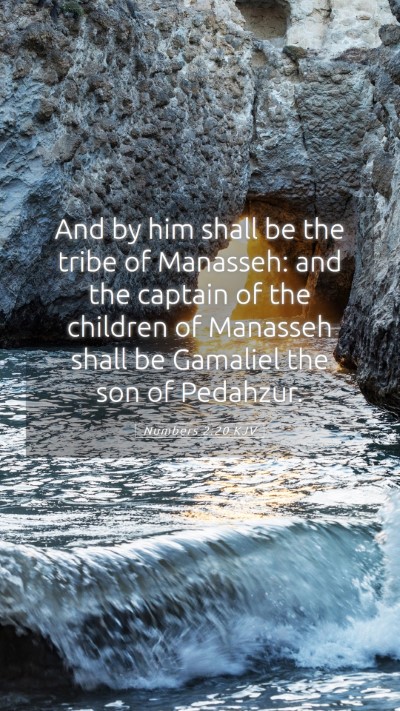Understanding Numbers 2:20 - Bible Verse Meaning and Commentary
Bible Verse: Numbers 2:20 - "And the tribe of Ephraim shall camp on the west side: and Elishama the son of Amihud shall be the ruler of the children of Ephraim."
In this exploration of Numbers 2:20, a deeper dive into its meaning, implications, and contextual significance is crucial for a comprehensive understanding of Scripture.
Contextual Background
The book of Numbers is pivotal in understanding the Israelites' journey through the wilderness. It deals with the organization, laws, and rituals that governed the Israelites as they prepared for entering the Promised Land.
Numbers 2 details the arrangement of the Israelite camp, where each tribe was designated a specific location around the Tabernacle. This organization was both practical and symbolic, representing unity under God's leadership.
Verse Analysis
This specific verse introduces the tribe of Ephraim, signifying not only their geographical placement but also highlighting their leadership role in potential military campaigns and spiritual matters.
- Tribe of Ephraim: Ephraim, being one of the sons of Joseph, had considerable significance among the tribes of Israel, often associated with strength and leadership.
- Elishama the son of Amihud: His mention indicates the importance of leadership. Elishama serves as a representative for his tribe, chosen not only for his lineage but also for his capabilities to guide.
- Positioning of Tribes: The arrangement showcases a divine order, emphasizing the importance of each tribe's role in the collective identity of Israel.
Commentary Insights
According to Matthew Henry, this verse showcases God's ordered plan for His people, reflecting His desire for structure and harmony within the camp. Henry emphasizes the importance of hierarchy and the meaning behind the camp's organization, which is a reflection of divine authority.
Albert Barnes elaborates on the significance of Ephraim's positioning and its leader, noting that Ephraim's prominence among the tribes foretells future leadership in Israel's history. He presents Elishama as a type of responsible leader, aligning with the biblical theme of accountability among leaders.
Adam Clarke draws attention to the historical context, reflecting on the tribe’s achievements and contributions to Israel’s legacy. He highlights how the organization of the camp served not only practical purposes but also spiritual significance, fostering unity among the Israelites as they journeyed toward their promised destiny.
Theological Implications
This verse holds theological insights into God’s providence and order. It reflects how God orchestrates events and leadership to fulfill His promises. The specific mention of tribes and leaders shows divine selection in spiritual leadership and guidance.
Application for Today
In applying the lessons of Numbers 2:20 to contemporary life, we can reflect on our own roles and responsibilities within our communities and spiritual families. The importance of leadership, accountability, and divine orchestration remains relevant.
- Recognizing the importance of structure and order in community life.
- Seeking God’s guidance in choosing leaders who reflect His character.
- Understanding our place in God’s greater plan for our lives and communities.
Cross References
- Genesis 48:19: The blessing of Jacob on Ephraim and Manasseh.
- Joshua 16:4: The allocation of territory to the tribe of Ephraim.
- Exodus 17:8-13: The battle against Amalek, showcasing Ephraim's role in Israel's military affairs.
- 1 Chronicles 7:20-29: A genealogical record that highlights Ephraim's descendants and heritage.
Conclusion
Numbers 2:20 offers rich insights into the spiritual and organizational truths about the community of God. By analyzing this verse through various commentaries, we gain a comprehensive perspective on its meaning, significance, and relevance today.
Engaging deeply with Scripture through resources like this can enhance Bible study groups, providing them with valuable tools for understanding the complexities and beauties of biblical texts. Whether for online Bible study or personal reflection, exploring such verses enriches our biblical literacy and fosters a profound relationship with God's Word.


